Blog
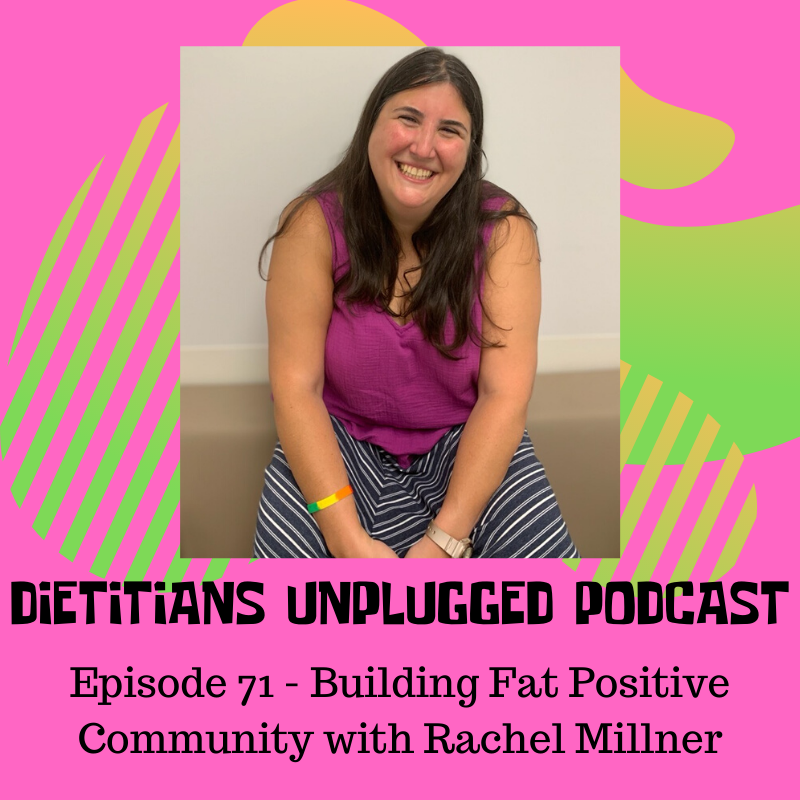
We are social creatures, and community is important. But when you are divesting from rampant diet culture and are in a larger body, how do you find community when so many people are spouting off about their current diets and body dissatisfaction?
On the Dietitians Unplugged podcast recently, we discussed this issue with our colleague, Dr. Rachel Millner. She shared with us her thoughts on the importance of fat-positive spaces for clinicians and individuals and how weight stigma continues to negatively impact those working on healing from their eating disorder.
Rachel Millner, Psy.D., CEDS-S, CBTP (she/her) is a psychologist/activist, a Certified Eating Disorder Specialist and Supervisor, and a Certified Body Trust Provider. Dr. Millner has been practicing as a psychologist since 2005 and has been specializing in treating people with eating disorders throughout her career. Dr. Millner works with people struggling with all eating disorders as well as those trying to break free from diet culture. Dr. Millner is a fat positive provider who works from a Health at Every Size® and Body Trust® lens.

Show Notes:
Dr. Rachel Millner’s website
Follow Dr. Millner on Instagram
Be the first to hear about the Self-Care for Diabetes program (Launching in early 2020)
Listen on:
Subscribe and get my free guide:
Why you overeat …and what to do about it
Click here if you just want my newsletter!
Blog
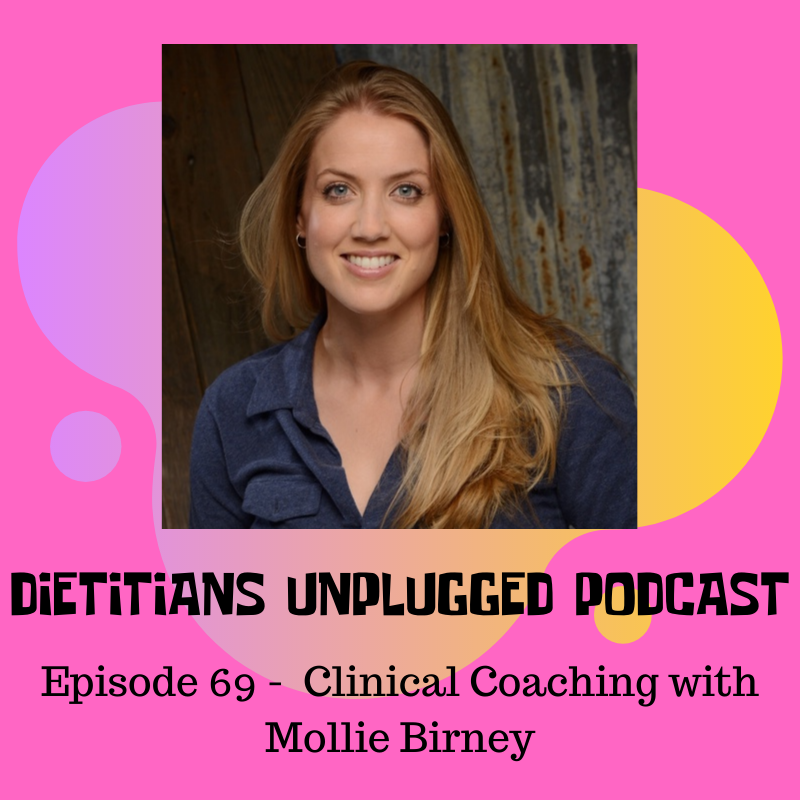
We welcomed Mollie Birney, Clinical Coach and Recovery Consultant with a specialization in the area of Eating Disorders and compulsive behaviors around food to the Dietitians Unplugged podcast.
Mollie holds a Masters in Clinical Psychology with a concentration in Addiction and Eating Disorders from Antioch University in Los Angeles, and has been in the field of mental health and addiction recovery since 2009. She has worked as a therapist with groups and individuals at all levels of care including inpatient, residential and outpatient treatment programs, as an interventionist for families in crisis, and as a private coach for high-performing individuals grappling with transitions and behavioral change. Her coaching style is deeply influenced by the principles of narrative therapy, and aims to arm her clients with strategies for challenging ingrained, and often trauma-informed belief systems. She has been in recovery from her own ass-kicking bulimia since 2007.

Show Notes:
Find out more about Mollie at her website: https://molliebirney.com/
Listen on:
Subscribe and get my free guide:
Why you overeat …and what to do about it
Click here if you just want my newsletter!
Blog
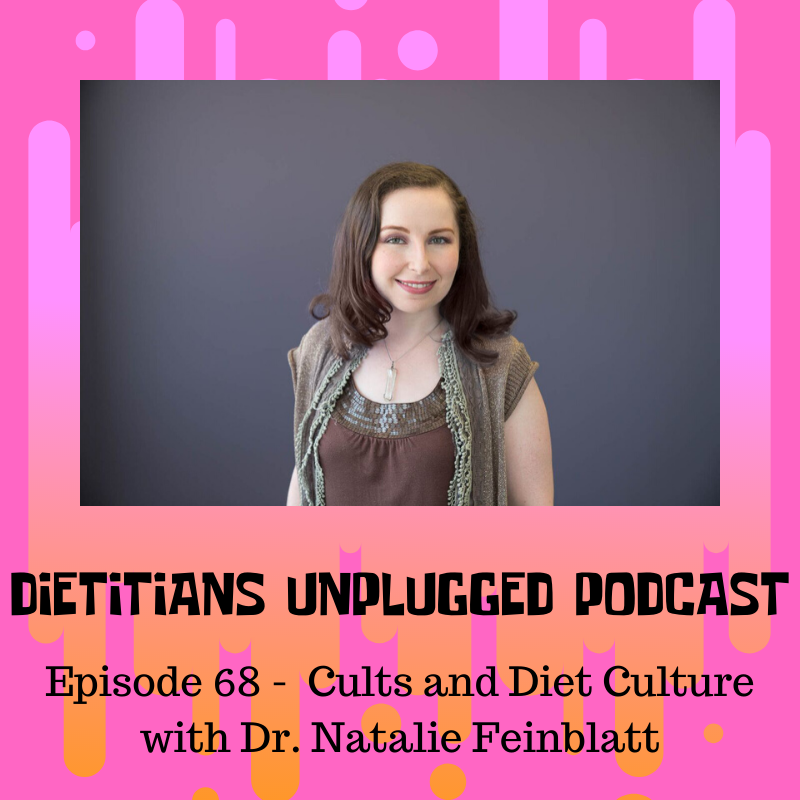
Did being on a diet ever feel like you were a member of a cult? Well, now we know there’s a reason for that!
In this episode of the Dietitians Unplugged podcast, Dr. Natalie Feinblatt, an expert in, among other things, working with former cult members, compares and contrasts cults with diet culture.
You’ll hear about what defines a cult, and how diets often align with these criteria. Most importantly, we discussed how to figure out if you’re in a diet cult and how to get free. (It’s hard for me to admit that this part was more important than our Days of Thunder discussion, but I’ll concede the point).
Dr. Natalie Feinblatt is a licensed clinical psychologist who sees clients in Los Angeles and virtually. She specializes in treating addiction, trauma, co-occurring disorders, LGBTQIA clients, and former cult members. She’s been working in the field of mental health for over 15 years at all levels of care, and earned her doctorate at Pepperdine University. You can learn more about her practice at her website, drnataliefeinblatt.com.

Show Notes:
Dr. Natalie Feinblatt’s website
Book: Diet Cults by Matt Fitzgerald
Listen on:
Subscribe and get my free guide:
Why you overeat …and what to do about it
Click here if you just want my newsletter!
Blog
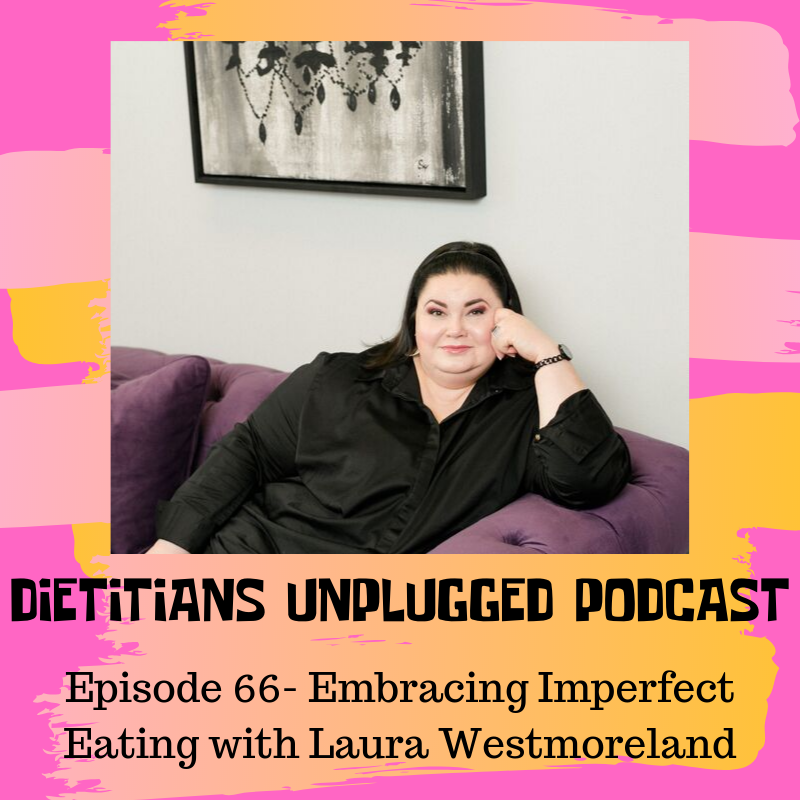
I am a recovering perfectionist.
I don’t know where I learned the idea that I needed to be perfect (not from my parents) but I really embraced this idea sometime in my teens and went whole hog on it by my 20s. I suspect it was a way to relieve anxiety about not being good enough in the world, but it eventually became an anxiety all on its own – and it never propelled me to where I wanted to go.
By the time I reached my late 30s and was back in school full-time, I was putting that perfectionism to use with great study habits and turning out amazing school work, but I was also wasting time, energy and stress because probably 90% of what I was doing didn’t need to be perfect. I have since learned when good enough is acceptable, and when to pull out that perfectionist streak (less often than you think).
I notice that my clients are often perfectionists, too. It’s my belief that anyone who has been on a diet for any amount of time is a perfectionist – even if they feel they “failed” the diet. Diets come with rules that you have to follow perfectly for “success” (except we know that failure is built-in to diets no matter how perfectly you follow them). When we begin to do the messy, ambiguous work of learning to honor body cues and appetite, perfection is not only needed, but it can hinder the process.
I was happy to talk about this subject with my wonderful colleague Laura Westmoreland, LMFT on the Dietitians Unplugged podcast. Laura, who is a certified Body Trust provider, talks about aiming for C level work when we’re learning how to trust our bodies. We don’t need to be perfect as we stumble towards compassionate connection with our bodies and ourselves, and in fact, expecting perfect work can even hold us back.
If you are a perfectionist and feeling anxious about not doing this work of learning to trust and respect your body “right”, then this episode is especially for you.
Show Notes:
Learn more about Laura: https://www.laurawestmoreland.com/
Follow Laura on Instagram
Listen on:
Subscribe and get my free guide:
Why you overeat …and what to do about it
Click here if you just want my newsletter!
Blog
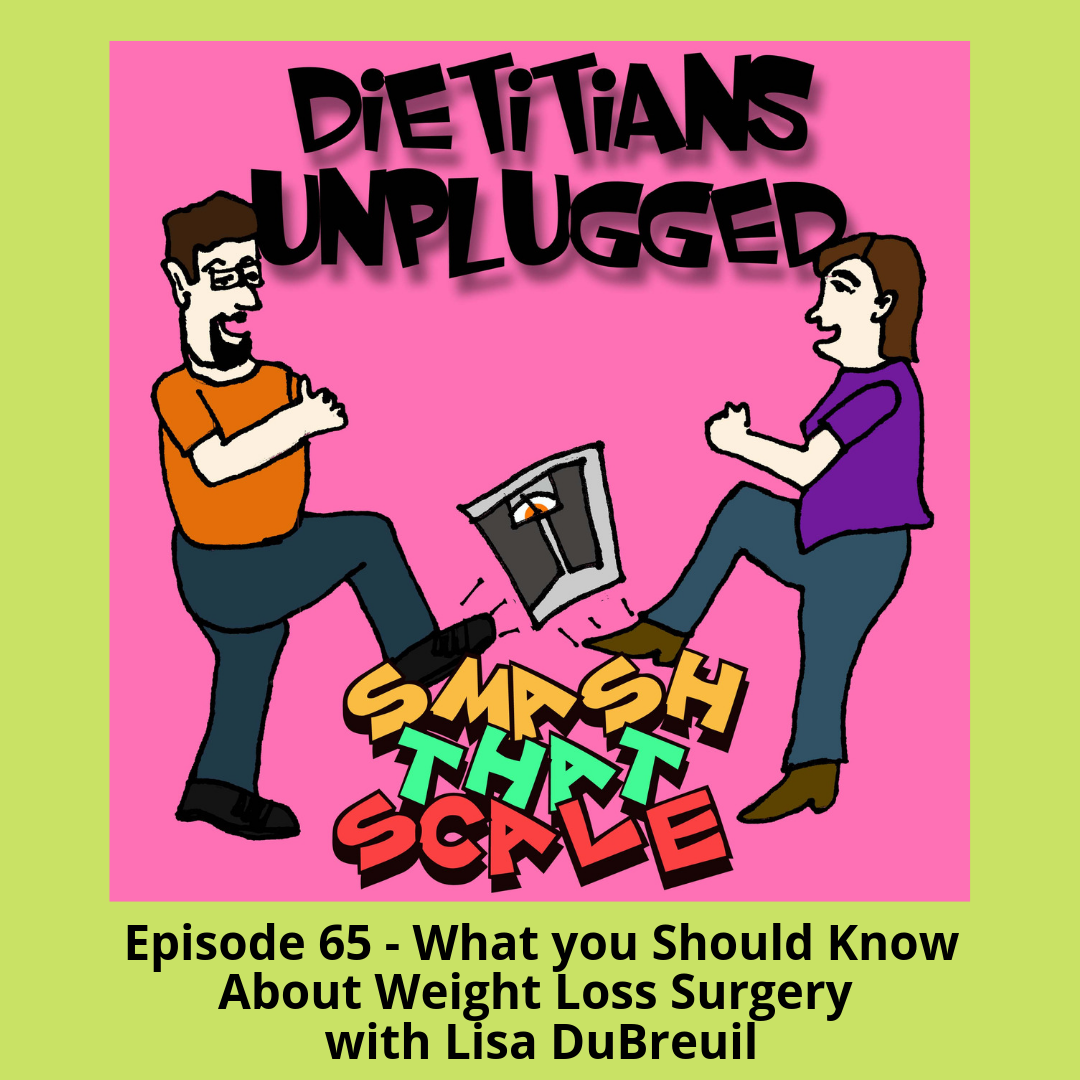
I want to be as transparent as possible about my feelings on this topic, so here goes.
I am not a fan of weight loss surgery.
I was not a fan of it when I first started to know people who were getting it, 20 years ago, even as I was steeped in diet culture. Twenty years later, I do not feel any better about it, based on the (scant) available evidence around the long-term outcomes, and on the personal evidence I have seen in my own life (weight regain, multiple surgeries, pain from surgery, and, sadly, even death). I don’t think the medical community does enough to prepare people for this surgery and the physical and psychological after-effects, and I don’t think it properly addresses possible underlying disordered eating which can continue even after surgery.
So that’s me. But I can’t make anyone’s decision for them. And I won’t judge anyone for choosing this surgery, especially in the fat-phobic culture we live in. What I can do is hold space for this kind of decision-making, and provide important information to help a person make a fully informed decision. (I, of course, prefer the path of radical body acceptance and Health at Every Size, but again, I can’t make that decision for others)
This Dietitians Unplugged podcast episode is part of providing that information. We talked to the wonderful, fierce HAES advocate Lisa DuBreuil, LICSW, who frequently works with clients who are considering or have undergone weight loss surgery. In this episode, we discuss the erroneous idea of “weight loss surgery as panacea”, how the medical community doesn’t do enough to prepare people before making this decision, and the possible medical and psychological consequences of having bariatric surgery.

Lisa’s website
Lisa on Twitter
Listen on:
Libsyn
Apple Podcasts
Stitcher
YouTube
Subscribe and get my free guide:
Why you overeat …and what to do about it
Click here if you just want my newsletter!
Blog
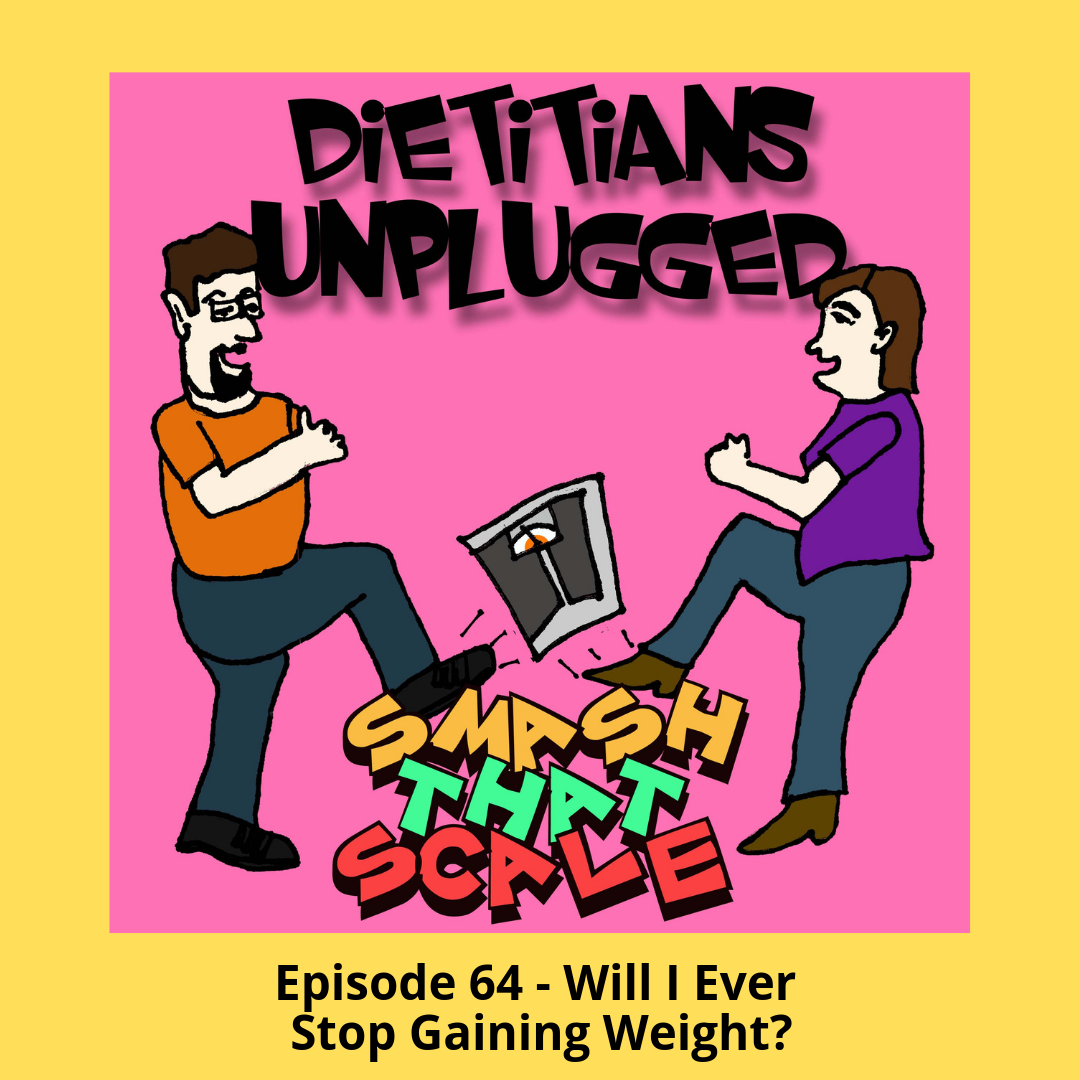
I hear this from my clients a lot: “I’m afraid I’ll never stop gaining weight!” Thanks to societal weight stigma, I understand why anyone would have this fear. Large bodies have long been stigmatized and no one wants to put themselves in the way of stigma.
At the same time, how do we control our weight as we go through the normalization process with food? The answer: we really can’t. After all, wasn’t it trying to control our weight, over and over, that got us in this mess of weight cycling and food struggles in the first place?
And yet – the pain of weight gain is real. We want to be relaxed, happy eaters, but when it comes with weight gain, the whole process can feel confusing and discouraging.
So in this Dietitians Unplugged podcast, Aaron and I talk about that fear, and also about caring for your body as it is now.

Show notes:
Undersummers Slip Shorts https://www.undersummers.com/
Other anti-chafing solutions: https://www.buzzfeed.com/nataliebrown/best-anti-chafing-products-save-your-thighs
Coach Cinder Ernst offers Plus Size Knee Pain Solutions
Listen on:
Libsyn
Apple Podcasts
Stitcher
YouTube
Subscribe and get my free guide:
Why you overeat …and what to do about it
Click here if you just want my newsletter!
Blog
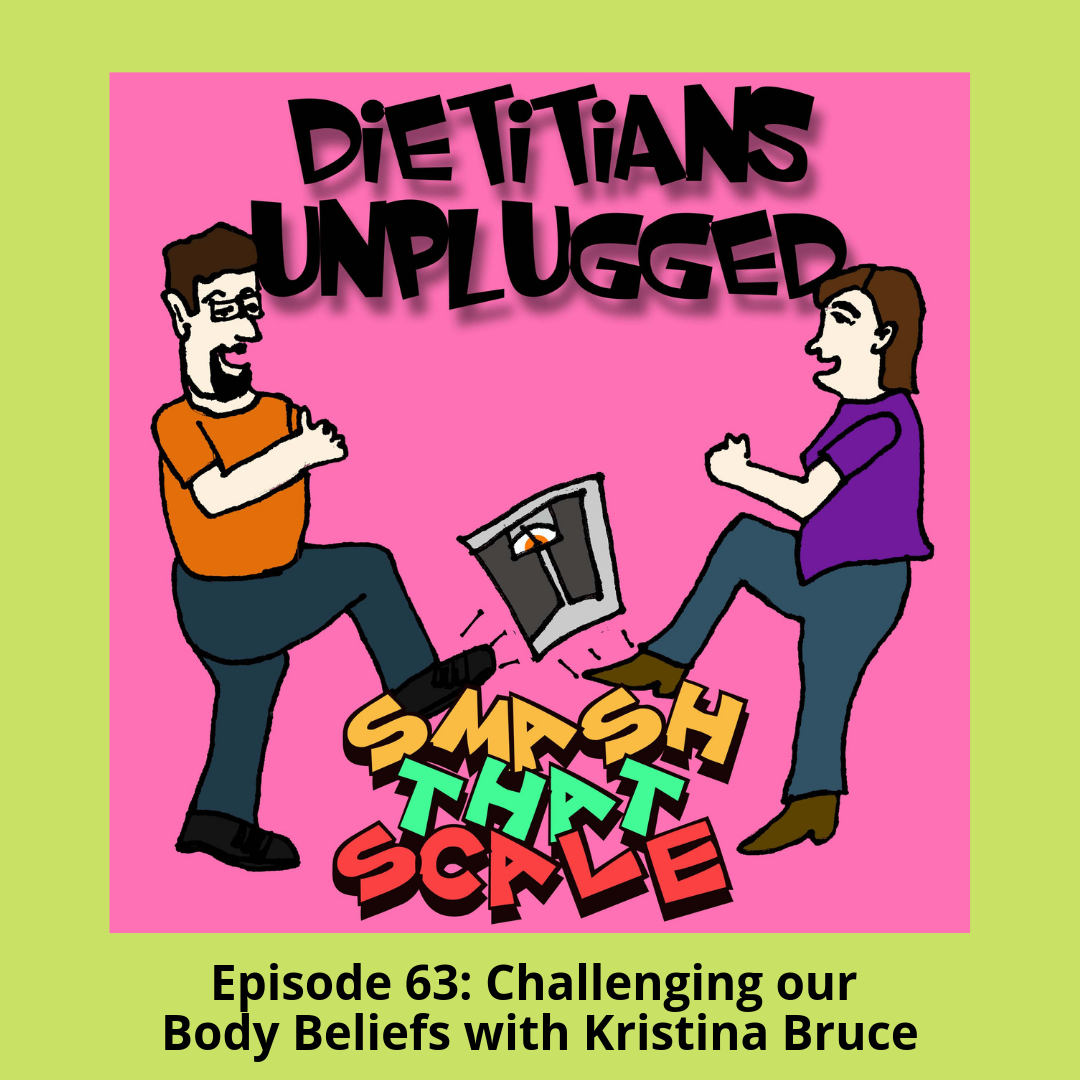
Aaron and I welcomed Kristina Bruce to the Dietitians Unplugged podcast to help our listeners learn to challenge negative, unhelpful beliefs about themselves and their bodies.
Kristina is a certified Integrative Life Coach, Body Acceptance Coach and Certified Body Trust® Provider. She employs Byron Katie’s method, The Work, to help clients question beliefs that cause them stress and to help see those beliefs for what they are — thoughts, not reality. During this interview, we were so grateful to Kristina for sharing an important tool to help do this work and this episode will be pivotal for anyone hoping to get free from the negative beliefs they feel about their body.
Show Notes:
Visit Kristina Bruce at her website
Subscribe and get my free guide:
Why you overeat …and what to do about it
Click here if you just want my newsletter!
Blog
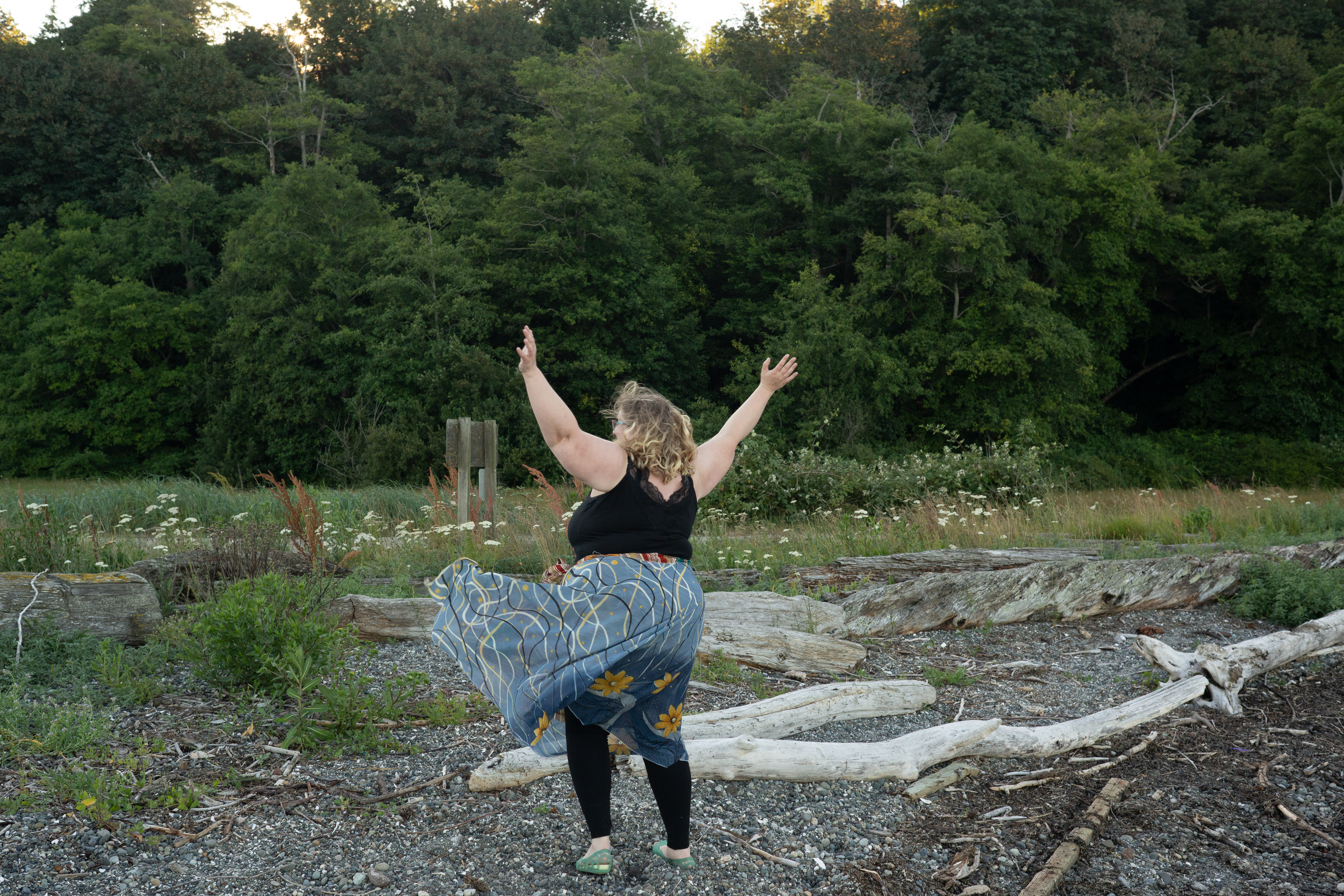
Photo courtesy of RepresentationMatters.me
“I used to love my thinner body, even though I hated dieting. Will I ever love my body again?”
This is an occasionally-heard refrain heard from some of the brave souls who have chosen to give up the pursuit of weight control through dieting and have instead opted for the unknown of what their bodies will do in response to a more peaceful relationship with food.
To review, there are three possible outcomes of giving up dieting:
- You may lose weight.
- You may gain weight.
- Your weight may stay the same.
For anyone experiencing any of these outcomes (even weight loss), the work of body acceptance is necessary to help clear the path to a more peaceful relationship with eating. This is the work of body image healing.
I love the goal of body neutrality as a result of the body image healing work that we do. Body neutrality, to me, means you don’t have to feel in love with your body or how it looks, but you don’t loathe it either. You’re able to see your body as an instrument, not an ornament, and get on with your life and all the things you want to experience in it.
But sometimes we wonder if we will ever get to a place of loving how our bodies look. For some, body neutrality doesn’t feel like enough, and they remember a time when they were maintaining a lower body weight, getting societal accolades, and enjoying the way their bodies looked to the world.
Rarely do we seem to question why we need to love how our bodies look. Would we have this same desire to love our appearance if there weren’t such strong cultural messages about beauty standards? Would this need exist if we were stranded alone on a deserted island like Tom Hanks in the movie Castaway? I strongly believe the answer is no.
That’s why we need to talk about self-objectification, which is experiencing one’s body not from the inside, but from the outside, looking in. It arises from an unfair system in which women are judged more for how they look and not for what they do (one of the many unpleasant side effects of patriarchy).
We are presented with a relentless barrage of media images of women and messages around what constitutes the “right” look (and from the mere absence of other types of images, we can easily infer what constitutes the “wrong” look). It’s so easy to constantly compare ourselves to these images and develop that outside-in-gaze that becomes more dominant than the experience of being in our bodies.
I think it’s lovely to be able to look in the mirror and say, “Yep, good outfit” or “Awesome style I’ve got going today.” That’s a world away from, “I love how my body is mirroring unrealistic cultural beauty standards by being as small as it can today!” The first two statements are about objects on your body; the latter statement is about your body as an object.
For me, opting for body neutrality and appreciation of its usefulness was a far saner goal than needing to love how I looked on a physical level, because I no longer wanted to be a mere object to be admired.
I don’t actually think we need to love how our bodies look to live a richer life. We do need to understand why that desire exists, though.
Here are two great blog posts about self-objectification from one of my favorite non-diet, pro-body sites, Beauty Redefined:
Selfies and Self-Objectification
Running from Self-Objectification
I hope you go straight down the rabbit hole of this site because they have so many wise things to say on the subject of self-objectification!
Need help managing your diabetes, pre-diabetes, or insulin resistance?
Care for Diabetes is back! Two tracks are available, starting on September 11 and September 13. Rebecca Scritchfield, dietitian and author of the book Body Kindness, and I will be providing sound and compassionate non-diet, non-restrictive, non-weight-focused advice and support for managing your blood sugars. Click on the image below for all the details about this 4 week virtual counseling group and how to register!
Thank you to Lindley Ashline at RepresentationMatters.me for her free stock photo images!
Subscribe and get my free guide:
Why you overeat …and what to do about it
Click here if you just want my newsletter!
Blog
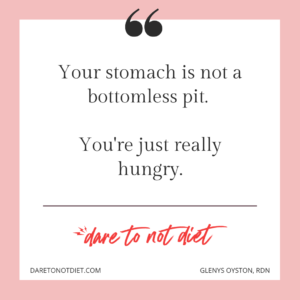
As a dietitian who helps others get over disordered eating after years of dieting, I’ve heard this many times: “I don’t have a limit when I’m eating. If I let myself eat what I want, I won’t ever be able to stop eating.”
To this I say: bunk. It just feels like that.
Everyone has a stopping point*. You might not think so because maybe you’ve stood beside the cheese tray at a cocktail party scarfing ungodly amounts of mediocre cheese cubes fearing you’d never stop. Maybe you stopped at bursting and that felt bad. And maybe you simply don’t know your stopping point because you are hungry much of the time…so very, very hungry.
Here’s a little secret
Dieting and calorie and food restriction create a false impression in your body that you are a bottomless pit. That you are a vessel that will never be filled, especially when you are confronted by a favorite or particularly delicious (or sometimes even mediocre) food. Maintaining a body weight lower than what is natural for you will also cause your body to constantly crave food, large amounts of it. Anyone who diets will likely experience this biological response regulated by a cascade of hunger hormones.
On the flip side, honoring your appetite (aka, eating intuitively) has the opposite effect. Once you begin to eat satisfying amounts of food when you feel hungry and your body weight adjusts toward its natural set point, your bottomless pit starts to find its bottom. As you practice honoring internal cues more often, you may start to find that your stopping point is not, in fact, stuffed but satisfied. You may even find yourself easily leaving food on the plate, or turning down the offer of a homemade brownie if you are simply not hungry for it.
You do have a stopping point
My bottomless-pit acquaintances are incredulous when I suggest that they do have stopping points. They don’t trust their bodies. Most are desperate to stay thin and know their natural appetite will support their desired size.
I understand why people pursue this path. But if constant cravings have taken over your life and preventing you from fully living, it could be time to give up the dieting.
When you truly honor your internal signals of hunger and satisfaction, eating what I really want, and letting your body be, you will no longer have fearsome, insatiable cravings. Honoring your appetite comes from a place of body respect and is an act of self-care.
Eating what you want and as much as you want may feel scary at first. As your body adjusts, that fear may turn to comfort as you realize you are taking care of yourself and your needs and you no longer have to fear your own bottomless pit.
*Some medical conditions excepted.
